
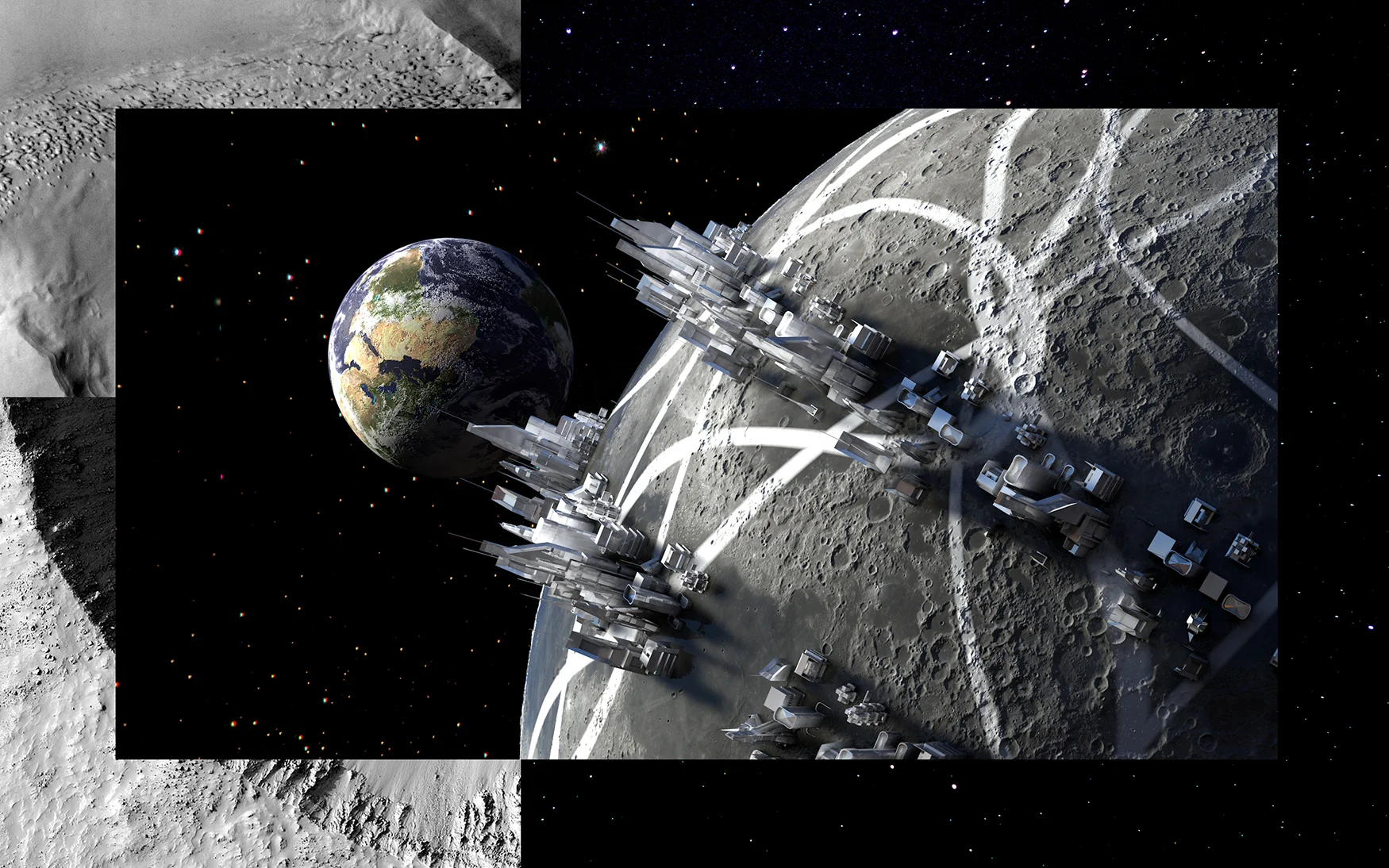
Throughout history outer space has proved an infinite source of awe and wonder for us mere mortals. Almost impossible to comprehend, it has spawned countless books, films, songs and theories, and resulted in a generation defining Space Race in the mid 20th Century. In this feature designer of experiences and filmmaker Dr. Nelly Ben Hayoun focuses on the Moon as the next frontier of space travel, looking at the complex and creative ways in which it is a part of our future.
Visuals by Dave Gaskarth.
There is little in Nelly Ben Hayoun’s work that is not influenced in some way by space. Whether in her role as vice chair of the Committee for the Cultural Utilisation of Space (ITACCUS) at the International Astronautical Federation or working with the Space Culture sessions at the International Astronautical Congress, the great unknown is a constant source of wonder and has inspired some of her most ambitious projects to date - most notably Ground Control: An Opera in Space, which was just that - the world’s first performance by the International Space Orchestra released from the International Space Station in 2013. And while this idea may sound like a scene from a sci-fi movie, it’s just one of the many examples of how Nelly has applied creative thinking to outer space. “For the past 10 years, I have been involved in various capacities in the development of future visions in space,” she says, “whether that’s building platforms for culture and experiences or critical thinking within the scientific community in order to develop new exploratory missions to explore life on our planet and beyond.”
Recently though, Nelly has turned her attention more specifically to the Moon, the area of space that governs, to a certain extent, what happens here on Earth. She is currently working on her fourth feature length documentary- titled Red Moon - that investigates diasporic and non-linear narratives for our future in outer space. “The Moon is universal,” she says. “Wherever you are in the world, you can see it and experience it.” And it’s because of this reason that Nelly believes we need to take greater steps to protect the Moon, and pay closer attention to the language used when discussing how the Moon fits into our future.
History is marred by the ills of colonization, and Nelly warns that humans could be set to repeat those same mistakes if we do not learn from our past. “I’ve noticed that the same vocabulary from our recent history, which involves the creation of empires and colonialism and war, is being used to reproduce similar ideologies for the Moon. There is a danger that space agencies and private investors are turning the Moon into a place where resources will be exploited and a site for new businesses, with mining at the core of a grand plan,” she says. “As the daughter and granddaughter of immigrants who have survived wars, genocide and the trauma of colonization, this repetition of history on an extraterrestrial landscape is unbearable. I can't believe that as a human species we can't come up with fresh thinking and new ways to apprehend politics, nation states and economics, so for me it is urgent that we focus on rethinking these plans now before others define the future of humanity on our behalf without any ethical, historical or creative considerations.”
And in this piece Nelly does exactly that. From musicians to activists to scientists Nelly poses one question to all: What does the future hold for humans and the Moon?
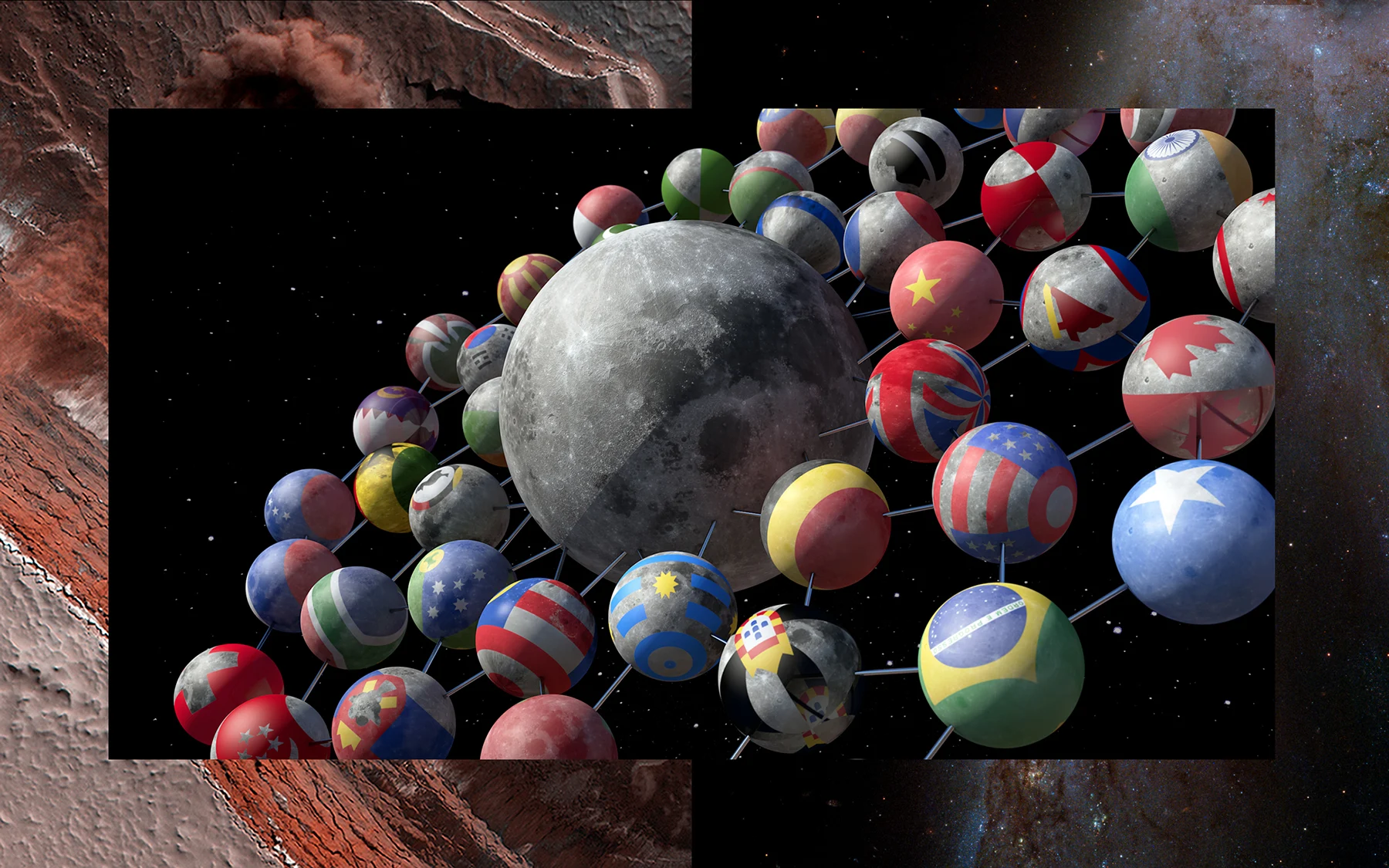
Douglas Vakoch on interstellar communication
As the president of METI International (Messaging Extraterrestrial Intelligence) astrobiologist and psychologist Douglas Vakoch is responsible for establishing contact with intelligent life in outer space, looking at the Moon and beyond. While working as a researcher with SETI (Search for Extraterrestrial Intelligence) Douglas founded METI in 2015, with the goal of not just searching for extraterrestrial communication, but also actively transmitting messages of our own - earning him the title of ‘the man who speaks for Earth’.
“My connection to the Moon comes from when I was a child. I grew up in the 1960s during the space age and the era of original Star Trek. I remember watching NASA prepare to go to the Moon and then eventually landing on it. Then, in the 50 years that followed, I watched as we never returned. For me, the Moon is a reminder of the human capacity to explore and discover, and I have always been intrigued by what is out there.
When I was growing up, there was a new field that was developing in space research called SETI - the Search for Extraterrestrial Intelligence. In the years since it was founded that search has become incredibly powerful. My work today with SETI essentially revolves around one question: If there is life out there, how can we communicate with it? The reality is that any civilization that may have independently evolved on another planet or star is not going to speak English or French or Swahili. So we have to find a language that we and they have in common. And that's what I have been focusing on throughout my career: a language to communicate across the distances between the stars.
Starting out in my career I initially studied the history and philosophy of science and got a Master's degree in that, but I was never a very good historian because historians are focused on the past. I was much more interested in the future. But when I finally decided how I was going to define myself, I actually became a psychologist and it was for two purposes. One was to be able to really understand what it is to be fundamentally human. How we think, how we feel, how we interact with one another. But it was also to bring a new perspective to the field of SETI, one that I felt was much needed.
Since its foundation in the early 80s SETI has been dominated by radio astronomers, engineers, physicists and computer scientists. Of course, all of those roles are critical to send signals and to know what stars to send them to, but we also need to start thinking about what extraterrestrial civilizations might be like, and so through my background in history, science, philosophy and, importantly, psychology, I bring new perspectives that help us develop strategies to make contact. And by contact I don't mean face-to-face.
We send messages that include music and art and a description of who we are as human beings.
The distances between the stars are so great that we may realistically never be able to do that, but we can send radio signals, very brief laser pulses that travel at the speed of light. There has often been a notion within the SETI community that any message that we send from Earth should have an agreed global approach. My concern with that is that if we only talk about the things that we all believe, it could be a very impoverished message and make humans come across as not particularly interesting. Part of our strength as a species is that we have many divergent views. A more productive model is for us to explain our contrasting ways of seeing the world and what we value. So instead of sending just scientific messages we also send ones that include music and art and a description of who we are as human beings.
One of the greatest challenges that SETI faces today is that humans continue to create radio and television signals that are similar to the signals that we're looking for from extraterrestrials, so there's a lot of noise and static when we point our telescopes toward the skies. The beauty of the Moon as a scientific location is that the far side of the Moon is shielded from all of the noise that we generate here on Earth.
When we think about the colonization of the Moon, though, we do need to consider that scientific priorities are not always at the top of the list compared to economic ones. There are treaties about the uses of outer space that would limit the ability to use the Moon but I think the real challenge is going to be whether those treaties get enforced. Is there enough of an international agreement to keep nations from going to the Moon and exploiting it for their own purposes? It’s highly problematic when countries think about going to the Moon with the intent of making it their property, because the Moon, according to international space treaties, belongs to no one.

Gregory Schmidt on exploring the Moon’s resources
When Gregory Schmidt was six, he would draw pictures of spaceships, and beside them he’d write, "When I grow up, I want to work for NASA." Fast forward, and he’s been there for 35 years. Gregory went from overseeing payloads at mission control to NASA Headquarters, where he managed advanced technology programs focused on life sciences. He then helped start the Astrobiology Institute which looks for forms of life on other planets, before helping to form the NASA Lunar Science Institute in 2008. Here, he speaks about the preparation underway to permanently put humans on the Moon.
We formed the NASA Lunar Science Institute in 2008. In 2013, we broadened our scope, and became NASA SSERVI (NASA Solar System Exploration Research Virtual Institute). We’re involved in the science that enables human exploration, as well as the science that is enabled by human exploration, bringing the best and the brightest in, not just the United States, but the world to bear on these very important problems. What we can do nowadays that just wasn't possible 20 years ago, is use our virtual technologies to connect people.
The Moon is something that we can see almost every night. It's right there. It's not a point of light that's very far away and hard to get to. It's not just any moon, it's our moon. The Apollo program, as great as it was, was not meant to have us step permanently away from Earth. Our long-term vision is not to just stop; it is to have us go out there. To the Moon and then to Mars.
To go there for a longer time, we need to know if the Moon could support our life, and there are a lot of very interesting questions that we are now trying to answer. For example, we need to learn more about the Moon’s resources. One of the things we’ve discovered is widespread water there. Subsequent missions and experiments have found this water, in what's called “permanently shadowed regions” on the Moon. Because of its orbital tilt, there are some craters close to the poles which haven't seen sunlight in hundreds of millions, perhaps a billion years, so water from comets and from other processes has accumulated.
I should mention that some of these shadowed regions are as cold as, or in some cases colder, than the surface of Pluto. The water exists as ice, but the idea is that maybe we can harvest and use it, and so NASA Ames is leading a mission called Viper, which aims to send rovers to test the water to see if we can use it.
I really believe in the adage of ’a rising tide floats all ships' and I think the tide is rising.
And that's a really, really important question for us. If we go to the Moon and we take everything that we will need with us, it's going to be prohibitively expensive. But if, instead, we can build using what we find when we get to our destination and only take what we absolutely have to take, we can carry out far more ambitious journeys.
Space travel in general is not the same as when I was a kid and I was watching the United States and then Soviet Union in this horrible fist-to-fist contest to get there first. There is competition, certainly, but there's a lot of collaboration as well. And there are countries all over the world interested in the Moon.
We’re supporting efforts in Germany, France, England, Italy, The Netherlands. I really believe in the adage of “a rising tide floats all ships” and I think the tide is rising. I think that those tides are going to rise for us all and get us out there to stay.
My hope is that we stay on the path we're on right now: That we land astronauts on the Moon in 2024, that we create a sustainable lunar presence and a lunar base. That commercial companies find their gold, if you will, on the lunar surface, find a way of making this profitable. That we establish a permanent presence and never look back. That's what I hope for.
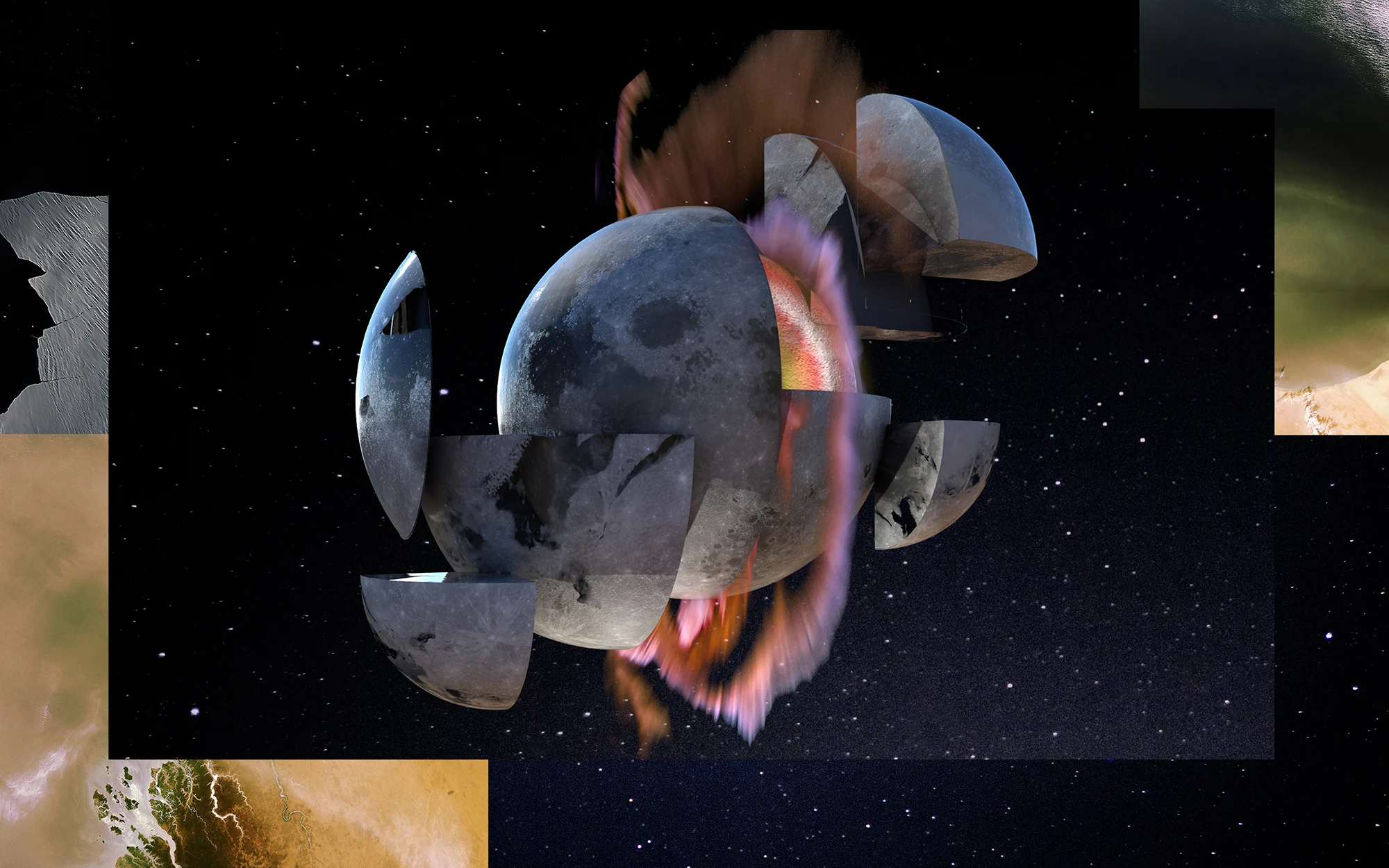
PUSSY RIOT on democratizing the Moon
Nadya Tolokonnikova is a Russian conceptual artist and political activist. She is the founding member of Pussy Riot: the world’s most prominent feminist protest art collective. Here she discusses the importance of democracy when handling the ethics of the future of the Moon in the hands of humankind.
What does space mean to me? First of all, it means keep wandering, keep being surprised and keep thinking past your own nose. I feel like it’s a major problem for humanity that we don't think beyond around four years in the future. A presidential term, essentially.
Our job as human beings is to keep being childish, retain our naivety. We all remember the moment when we first looked into space and saw all the dots and were like, “Oh! We're one of those dots.” When we were kids, we read stories about space exploration but then, all of a sudden, most of us abandoned it, and now we're reading about what Trump ate for breakfast.
I'm all for bringing back space into our everyday conversation because it is us who must decide what is going to happen with and in space. Right now we feel like, “Oh, it’s so far away, it's not my main concern." I mean, for most people it’s not a concern at all. But I would encourage anyone who can to really think about it, because this is our planet and our planet is part of the bigger universe. If we do not write the narrative of how we are going to explore and use space, then somebody else will. That's more or less what happened with Earth: a bunch of wealthy people took control of the narrative of what they would do with our natural resources and what our future would be.
If we do not write the narrative of how we are going to explore and use space, then somebody else will.
We have to preserve what we already have and we have to think of how we will ethically inhabit the other planets. I'm not one of those people who thinks we should not use them at all, but I feel we need to have this discussion of how we use them at a public level. I feel like since humankind invented the nuclear bomb, science questions are never just pure science questions. They're always ethical questions that have to be discussed openly. The Moon has to belong to the whole of humanity. I don’t know how, or when, because I'm not a fucking economist or a lawyer, but I know I don't want the Moon to be divided just between the world’s biggest corporations.
For me personally, the Moon and space have been a huge help in terms of quelling my anxiety. When I was a kid I was an overachiever, so I was always really worried about getting the best marks. I was on the verge of a heart attack every time I was about to take an exam.
To calm myself down I would just stop and think about the Moon or the stars, and I'd think, "Okay there is no need to worry! In the grand scheme of things, this exam doesn't matter that much." All of a sudden, I was calm and totally zen. That is my method for getting the best marks, because when you worry – even if you know everything – you will not perform your best. Use the Moon. Use the Moon for getting rid of your anxiety.
If the Russian government decides to send anyone to the Moon, I’d like to think it would be me. Mainly because I’m really getting on their nerves! They’d be like, "take her as far as possible from here!” If I did go, I would try to show people how beautiful it is and what possibilities the Moon holds other than just for mining. I would definitely create a piece of art about my presence on the Moon.
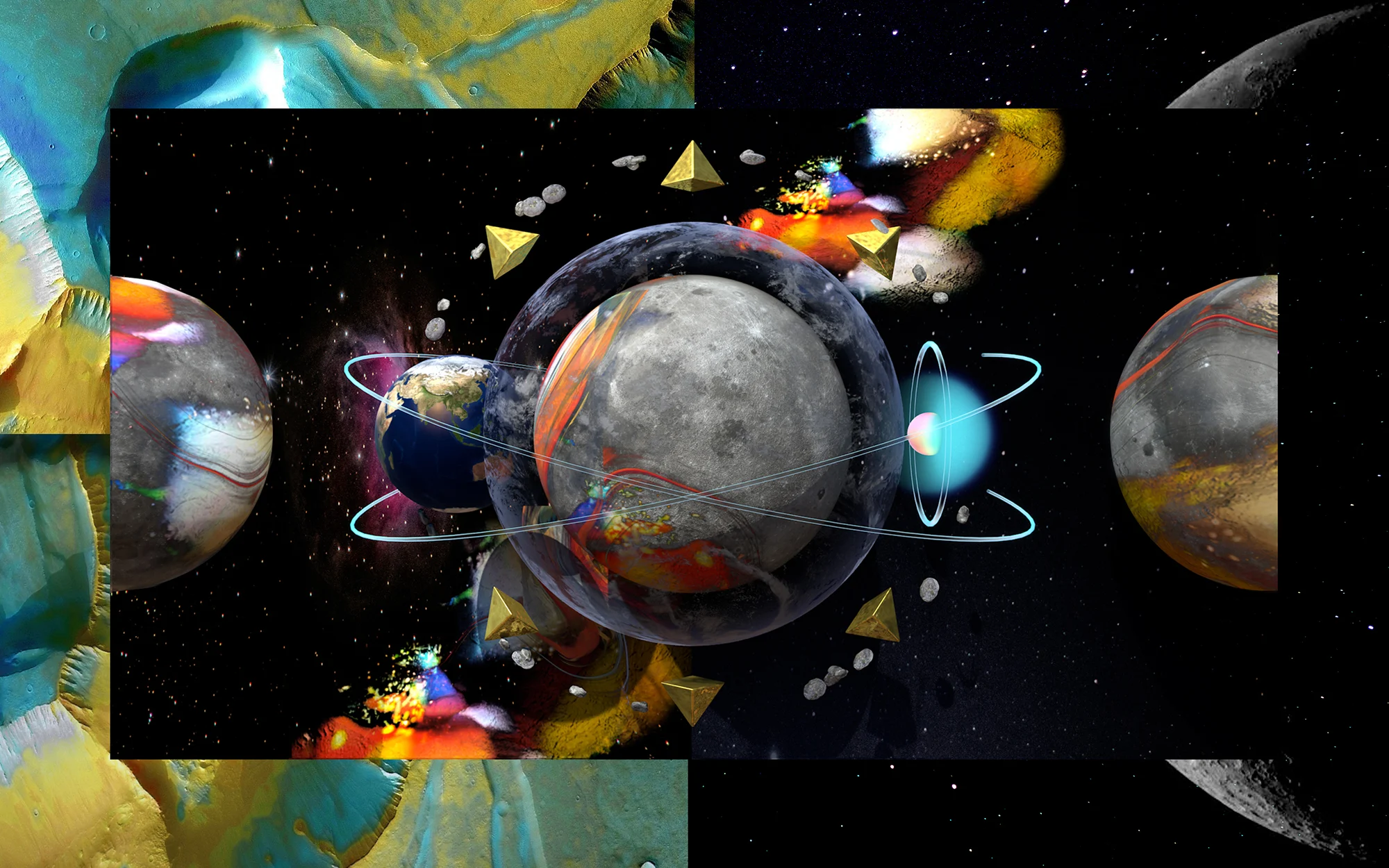
Magid Magid on education systems on the Moon
Magid Magid is a British-Somali activist who came to the UK at five years old as a refugee from Somalia, settling in Sheffield. In 2018, before he had turned 30, he was elected as the Lord Mayor of Sheffield, becoming the first ethnic-Somali and the youngest ever Green Party councillor to hold the role. Magid is currently running a programme at the University of the Underground called New Politics and Afrofuturisms, and through his work sees education as the key to creating alternative societies, even on the Moon.
“My work has always revolved around climate change and racial justice, and standing up for the rights of migrants and refugees. In terms of the way I go about things I’m unapologetically myself and I use my authenticity and creativity to get my message out there.
The Moon and outer space is something that really impacts me and how I feel about what I want to put out in the world. Decades ago there was a famous speech made by former President of the United States, John F. Kennedy, that still inspires me. When he was talking about space exploration and why the US were choosing to do so he said that it's one of the biggest adventures any man or woman as part of the human race can undertake. There’s a line from that speech that has always stuck with me: "We choose to go to the Moon, not because it's easy, but because it's hard." And I think that there's real importance to that. Regardless of where you are in the world - you can be in Somalia, you can be in Sudan, you can be in Samoa - everyone sees the Moon. As different as we are, we're all looking at the exact same thing. We're all connected to the Moon.
It's important to point out that nothing we see in the systems of education, politics - whatever it is - is naturally occurring. Unlike the Moon, everything is man-made. We need to realize that we have the power to change things and we don't have to accept or tolerate everything how it is.
With this in mind I think we need to be more ambitious and really challenge these old systems and ways of thinking. The education program that I’m running at the University of the Underground is called Afrofuturism and New Politics and it focuses on Black radical imagination and pop culture as powerful vehicles for propelling progressive social change. The course is designed to really challenge students to see what is possible. Can we have an alternative future, an alternative society? What will that look like? What are the values of that?
As different as we are we’re all looking at the exact same thing, we're all connected to the Moon.
Interestingly Afrofuturistic aesthetics themselves look like the Moon. One of the pioneers of Afrofuturism is the science-fiction author Octavia E. Butler. She wrote the Xenogenesis trilogy which depicts stories of space exploration. You can't separate Afrofuturism from space and the Moon because it really explores the mythologies of how we can use the energy of the Moon to impact our daily lives. It’s about using the Moon, not just as a symbol, but also as a way to harness that energy.
Education is the cornerstone of enlightenment, it’s the opposite of ignorance. And education is not just about learning new things, it’s also about challenging our own set of prejudices, our own set of beliefs that the society we're born into has constantly taught us. If the goal is to try to build a new society or to have that new level of thinking, whether that be on the Moon or somewhere else, education is at the heart of it.
If we were to build a new society on the Moon, we would only achieve it if everybody is involved. It’s imperative that people from all walks of life, regardless of gender, race or, socio-economic background you come from, are involved in that discussion and that space. Otherwise it's not going to be the best that it can be. So if you're a writer, write something about the Moon. If you're a comedian, create some jokes around the issue of space. And if you're into AI and tech and all that, then create some software that will mean that, regardless of where you are in the world, everyone can access it and be part of this new wave.
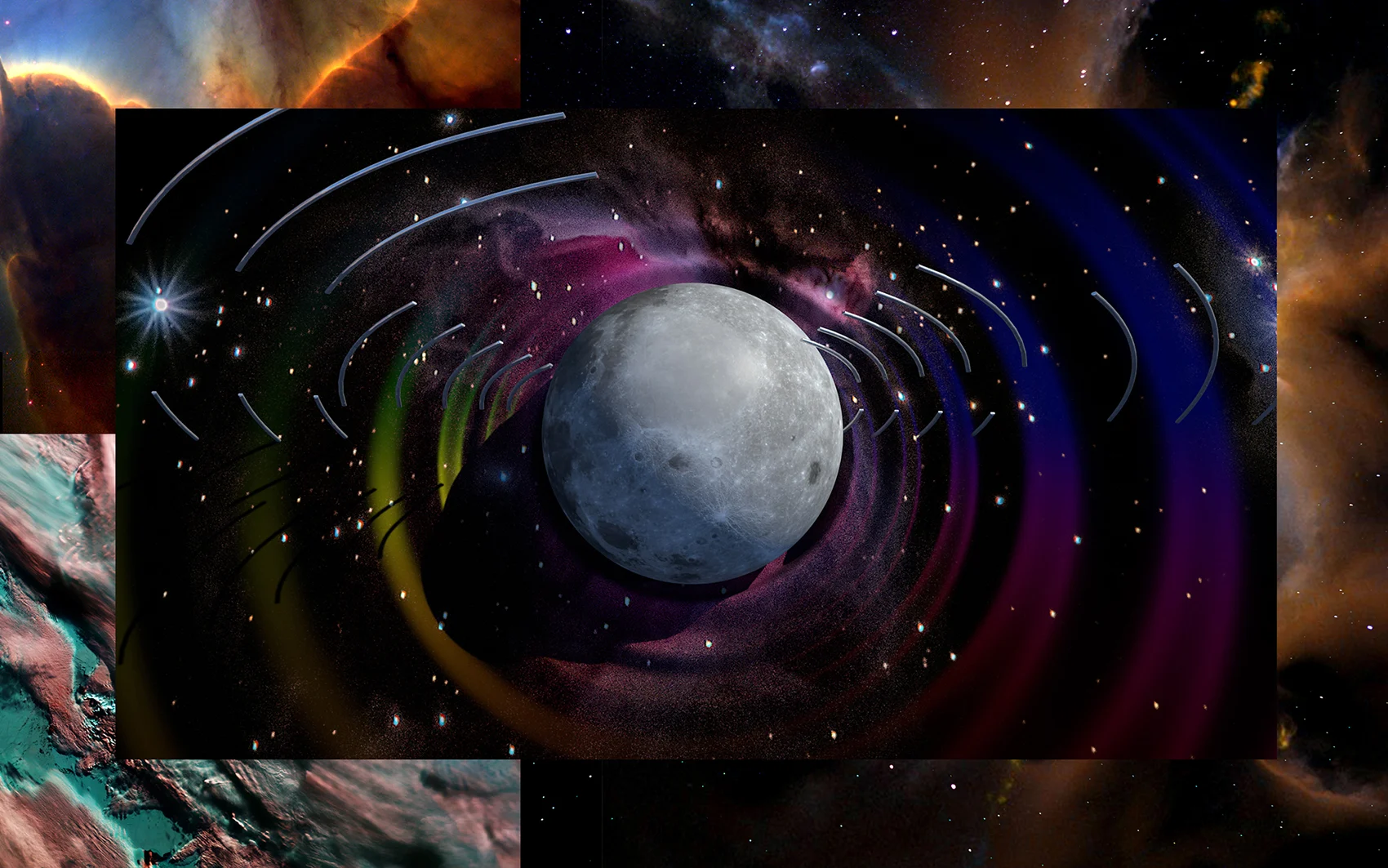
The Avalanches on the cosmic, musical experience
The Avalanches are a critically-acclaimed experimental Australian music group formed in the late ‘90s. Here they discuss their fascination with collecting and using historic music samples and sound effects in their recording process, and the infinite beauty of all of history’s music travelling out into space.
We’re writing an album related to space. It began in a strange way: we became curious about the way that an old record is like a time capsule of someone's life. What was going on in that person's life when they were making that record? This moment is frozen in time. Maybe they were in love or they were going through a breakup or their child had just been born, and they poured it all out into this song. Then it gets played over decades and every time someone listens to it, it gets more crackly. So everybody along the way is adding to the sound of it and we will find it and sample it. The musician who made it may have passed away a long time ago, but it's like they're living on through the recording.
We started reading about radio transmissions and every transmission that had been broadcast ever from planet earth. We considered how every song that's ever been played on the radio is still floating out there in space, and all the voices of their seniors who may have passed away, like Elvis or John Lennon or whoever, are floating out there in the cosmos. It's a choir of people's spirits floating around out there. We found that to be such a beautiful idea.
The cosmic experience is almost about exploring the infinite and the inner at the same time; it’s about really thinking about, “who are we really?” Without wanting to sound like old hippies, vibration is everything, right? It's sound waves and light waves. It's all just information hitting our bodies. And then we interpret it and give it all this meaning.
Our new album is full of hidden messages. There's the message in the lyrics. But then underneath the music is every sound, every crackle and every static blast. There are recordings of black holes that make up the drum beats. There are static recordings from mediums who are contacting people who have died, they recorded their voices and those are in the songs as well. There are messages that, when you play them in a spectrograph, make pictures hidden in the songs.
We are already out there. We’ve just got to tap into it.
We've collected so many fragments of voices from well-known recordings and un-well-known recordings. And we’ve combined them together to make choirs that sing behind the music, all these fragments of voices. To me they're like souls, and each little note is layered with meaning and connection from the past in someone's life. It's like voices from the past, all singing through this record and out into the world again today.
That's just the most beautiful concept to us. And it's just connection. The human voice has always been how we've tried to connect with something greater than ourselves.
I think we're coming full circle now to why we were so interested in sending the message out to space, because then the journey just continues and continues. I find the whole thing very humbling because we become a very, very small part of the cycle. It's like the cycle of life.
I often think about how when we’re performing in another country like Japan and there's like 40,000 people there and they sing along to one of the songs. But the vocal in the song is from a record I've found from the '60s. We’re just a very, very small part of that whole energy flow. And it's incredible just to watch it all flow and bubble around you. It’s very humbling.
The message of our music is love and connection. When we're connected with that, life and possibilities feel infinite and anything feels possible. Music is so powerful in changing the way you feel. When you wake up in the morning it can really bring you back to your humanness and to what is beautiful in life. So in that sense, we are in the cosmos already. It doesn't have to be what's out there. We are already out there. We've just got to tap into it. So, hopefully, the music is a message of love.

